

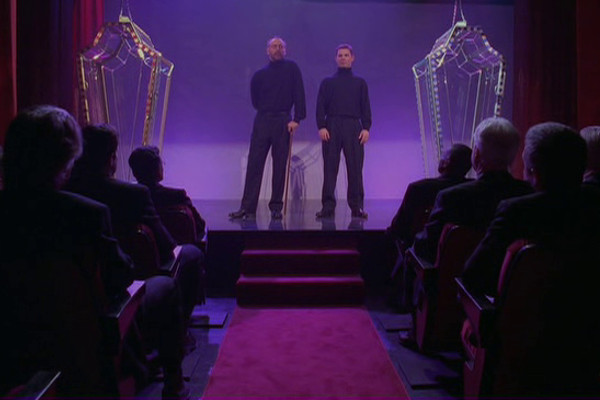
Shawn Hatosy stars as Mario Devlin, a performance illusionist who undergoes daredevil feats. Although supposedly a fictitious magician, it should be noted that David Copperfield was calculated as being in the top ten highest-earning celebrities the year this aired, and that two of his feats - "The guy who walked through the Great Wall of China"; "The guy who made an aircraft carrier disappear" - are name-checked, with two possible explanations of the tricks given. Given the amount of litigious cases Copperfield was involved in, it's a wonder he didn't take umbrage to an episode that has a man who performed his unique tricks slated as "You're vain, you've got a mouth, you need a freakin' personality transplant."
The episode opens with a leap down into a box topped with rotating blades, which ably illustrates the apparent lack of budget: while many episodes seem to feature the exact same "mansion" redressed, this one opens with a crowd gathering to watch Devlin perform a daredevil feat. Although the "crowd" is sizeable, appearing to contain at least 50 extras, it's still an incredibly small crowd for such an event, no deeper than three people thick, and thinly spread around. This also extends towards Devlin's "levitation", which was perhaps passable CGI 15 years ago, but hasn't aged particularly well.
The episode is fairly interesting, though, again, the "twist" will be apparent to many long before its reveal.
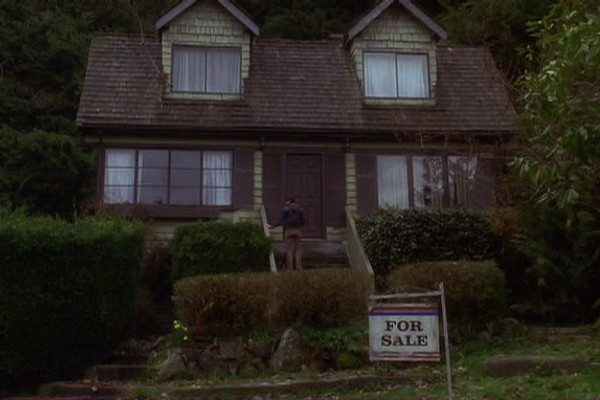
Possibly ranked too highly, this episode scores not by any merit of its own, but just by being not as bad as most of what ranks below it. Featuring a photographer, best friends with a priest, who has the ghost of her dead boyfriend pointing the way to future love, it's a pretty forgettable instalment, although Robin Tunney is likeable enough in the lead role.
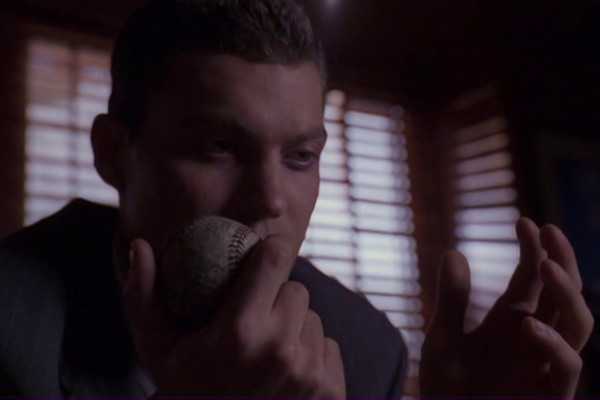
Frederick Rappaport wrote five scripts for the series, all of which varied widely in quality from the decent (The Executions of Grady Finch/Dead Man's Eyes) down to the some of the worst episodes of the entire season (Sunrise/Dream Lover). There's a good, even great, episode here, but it's lost amid a lack of focus and Mark Snow doing his best "Hallmark Channel" tinkly piano music. A man's first love returns, giving him a rare signed baseball he stole from his father when he was 17, using the sale profits to fund his business. Growing up as a loveless businessman, he ends the episode by having a second chance, refusing to steal the baseball and choosing love over money.
None of this is as well executed as it could have been, and star Brian Austin Green, who wasn't even thirty when this was filmed, looks too young to play a businessman who was 17 in the 1980s. The actual story itself came from Billy Mumy, and it is, in essence, a worthwhile one, with ruminations on the things left behind... it's just a shame that the outcome of his idea didn't realise its full potential.
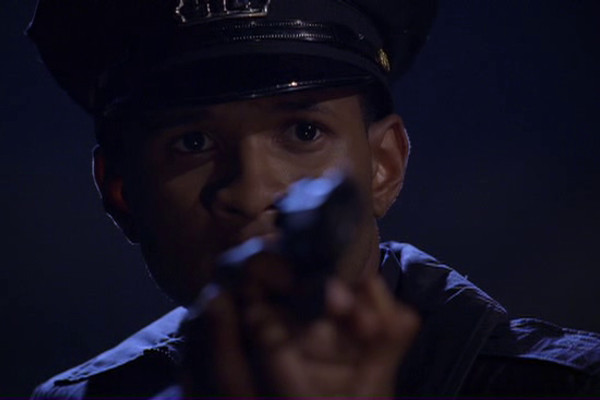
The issues behind adapting a television franchise are many. Keep it the way it was, and it'll appear dated. Update it too much and you'll lose the essence of what the programme was in the first place. The original Twilight Zone was largely an "all ages" show; the raciest it ever got was probably a love potion in The Chaser. As a result, it's hard to contend with this being the same series when it opens with a pimp threatening to slit a prostitute's throat with a flick knife... if nothing else, it's hard to imagine Rod Serling walking on and introducing it.
After a cop shoots the pimp dead, he's plagued by phonecalls from the pimp's spirit. Although this version of The Twilight Zone wasn't inundated with huge star cameos, said cop is played by Usher, probably the most famous guest star, followed by Jessica Simpson in The Collection. The episode, despite its non-family friendly set up, is actually quite scary in parts, touching on the "calls from the dead" theme that was essayed in the 1964 episode Night Call.
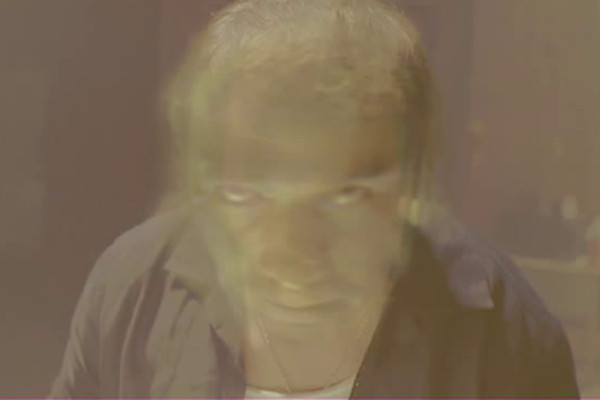
Jeremy Piven stars as a man hit by lightning, an accident that results in him being able to hear the thoughts of others. As his power grows, his sense of morality begins to go awry. Directed by Jonathan Frakes, there are some examples of poor continuity in this episode (a bunch of flowers becomes a bottle of beer in Piven's hand during one change of camera angle) but this is generally a well-told and engaging story, even if it gets a little sillier as it goes on. The only double-length episode of the programme, lasting just over 40 minutes, it was intended to launch the series, before being pushed back to sixth place in the running order. Although it only just scrapes into the top twenty here, it would almost certainly have been a preferable starting point to the stories they eventually ran with.
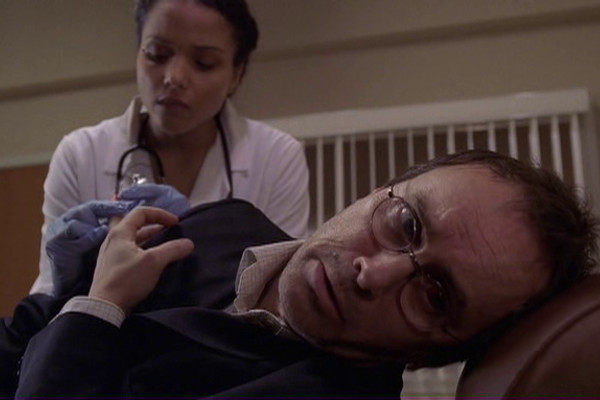
An episode with more "name" actors than most, as Jeffrey Combs appears, alongside Sidney Poitier's daughter Sydney. Poitier is a likeable presence, and the two have an easy rapport, though what's striking is the height difference. Combs, just a little under average height at a reported 5'7, is dwarfed by Sydney, who breaks the six foot mark in heels. (Tarantino fans might recall her being referred to as a "pituitary case" in Death Proof).
Harry Radditch (Combs) is a hypochondriac who is normally treated with the placebo effect of the title... however, this time he really DOES have an illness, in the form of burst blood vessels, non-clotting blood and a series of strange lumps all over his chest. Eventually he reveals that the symptoms of his illness come from a sci-fi novel. Not an episode to watch while eating dinner, the sight of Combs with a blood-stained eyeball, or his housekeeper with blood from her mouth and eye sockets, may not be for the squeamish. The episode content and its resolution may be a little too fantastical even for The Twilight Zone, and it's a testament to the general low quality of this series that a likeable but slight episode such as this would rank so high.
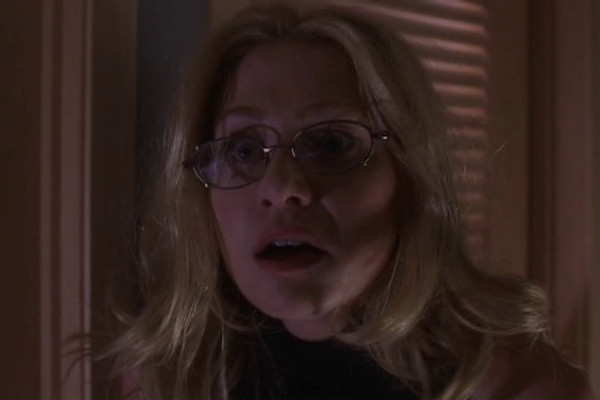
Dead Man's Eyes appears to be inspired by the original series episode Dead Man's Shoes, although, unlike the first time it was adapted (with Helen Mirren in 1985 as Dead Woman's Shoes) there's no credit to Charles Beaumont. However, what these various different adaptations of the same basic concept illustrate is how The Twilight Zone fails to work outside of its original form. Having begun way back in 1959, the original show was set-bound and consciously wordy, almost like stage plays with a vaguely noirish bent. The series was made before the real onset of naturalistic acting, and while the performances in the original programme are fine, even great, they don't owe a debt to strict method acting. All of which gives the original series its charm and enduring appeal, and helps to make the hokier concepts - such as a man who wears shoes that are possessed by the soul of the deceased - so palatable.
Thankfully, such an outlandish, albeit likeable, concept is made more believable here, as the glasses of a murdered man show his final moments before his death. To say more would be to give away too much of the story, but suffice it to say that this third take on the initial idea is by far the most well-developed, plot-wise, and there are twists and turns that make it more than worthwhile. Sadly, what keeps this somewhat short of the 1962 original is that the acting isn't quite strong enough to carry the episode, and Mark Snow's incidental music is at its most intrusive.
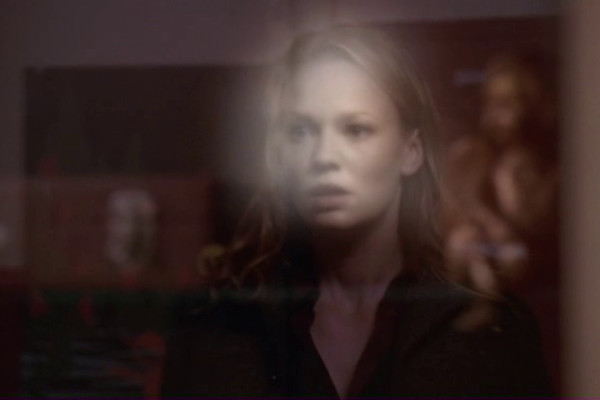
Lou Diamond Phillips gets a chance to direct in this story of a teacher (Samantha Mathis) who sees light around people when they're about to die. A quite clever and pertinent plot sees the revelation that one of the students who doesn't have a light around him is, in actuality, a psychotic shooter. Almost painfully close to topicality, this episode aired less than four years after Columbine, and sees such intense revelations as the teacher seeing herself in a reflection with a white light. What begins as a fairly general episode develops into something more meaningful, which is what the series should be - even if the message is a little clouded, particularly with Mark Snow's muddled incidental score.